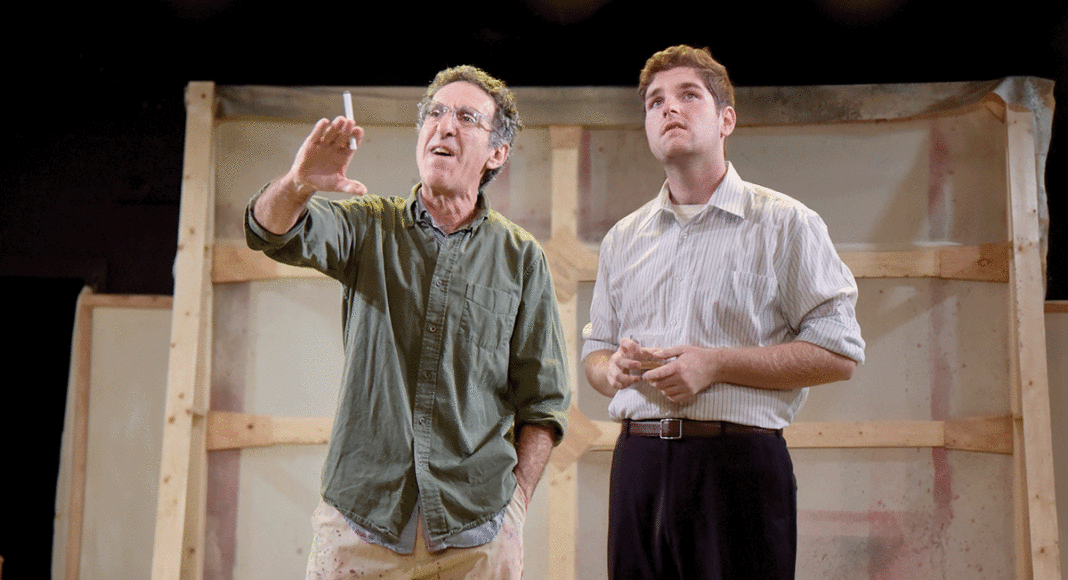Armed with the Tony-award-winning play Red, director Wilma Marcus Chandler has injected her considerable dramatic savvy into an intense theater experience.
An actor’s feast, the two-man exploration of the psychology and genius of painter Mark Rothko gives the audience a crash course in modern art history. Admittedly, viewers with a background in the rich ego-driven debates of Abstract Expressionism will be most captivated. Those for whom the names Jackson Pollock, Willem de Kooning, and Roy Lichtenstein are rather vague might find the name-dropping texture of Red a bit more of an art history lesson than a living drama.
The play by John Logan depends entirely upon the push and pull between visionary, hard-drinking, angst-ridden Rothko (played to the hilt by Martin Sampad Kachuck) and his young, overwhelmed studio assistant Ken (played with earnest fervor by Robert Gerbode). Their dynamic doesn’t merely drive the play, it is the play. And for a brisk hour and a half, the master and assistant represent not only the Dionysian and Apollonian archetypes of chaos and order, but also the Old Guard reluctant to give way to the Next Wave in visual culture. Freud on steroids!
The show belongs to Rothko and from the start, as we first see the painter smoking in his studio, transfixed by his latest work, Kachuck hits the stage running. Energy surges from his body, his face, and his impressive vocal range—the actor is one with his character. And one suspects he also believes in the primal vision of Rothko, considered one of the mystic giants of modern art. Defying any genre label—although Abstract Expressionism eventually stuck—Rothko railed against the cheap popularity of some of his colleagues, and lamented even more the pop art celebrity of Warhol and Rauschenberg pushing his own fame to the sidelines.
During the period covered by Logan’s script—the very late ’50s—Rothko has become the cranky deity of pure abstraction. Agonizing over the creation of each large canvas—“10 percent is putting paint on the canvas, the rest is waiting”—Rothko begins an intellectual struggle to indoctrinate his new assistant into the inner mysteries of painting. What ensues is a master class in 20th century psychoanalysis, 19th century philosophy, and an often very funny verbal exploration about the nature of paintings. “They move, they change, they pulse—there’s tragedy in every brushstroke,” Rothko insists to his perplexed assistant. The play’s juicy love letter to Matisse’s Red Studio is breathtaking.
The play moves forward in time briskly. Rothko and Ken seem to work smoothly together, yet their back and forth dialectic grows louder, and digs deeper, eventually teasing out a personal tragedy buried in Ken’s unconscious (one of the playwright’s missteps). Essentially, the play is a one-man drama, with the assistant an externalization of Rothko’s own pedantic persona, as well as Greek chorus and devil’s advocate. The two final scenes focus on Rothko’s ambivalence toward an infamous commission he has accepted, to paint a series of murals for the Four Seasons restaurant in New York’s Seagram Building. Rothko’s love for these paintings, their vulnerability, and his fatherly despair about their well-being, are all revealed in Logan’s poetry. And yet the playwright seems unclear as to where and when the play should end. Opening night’s final scene felt more like an addendum, rather than the denouement of the emotional arc.
Nonetheless, Red’s writing is so kinetic and rich, so illuminating of the artistic process—certainly Rothko’s—that we can practically chew on the lines cut, hewn, and shaped by the eminently watchable and listenable Kachuck.
Anyone who paints, or grasps the ambivalence of authentic artistic creation will be enthralled by the scripted pyrotechnics. Kudos to Chandler, who understands how to move her actors around the stage, and through the script—and then step back and let them work. And praise for evocative lighting by Carina Swanberg and the spot-on set design by Skip Epperson, who has created a complete studio in which any painter would feel at home.
Red will whet the viewer’s appetite for Rothko’s work and his eccentric grand vision, all the more compelling in a non-visionary 21st century. It’s a crisp, challenging bit of theater.
‘Red’ by John Logan, will be presented by Santa Cruz Actors’ Theatre at the Center Stage Theater, 1001 Center St., Santa Cruz through Oct. 21. sccat.org.












